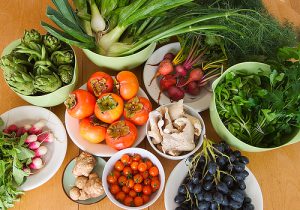While scrolling through your preferred news outlet in the morning while eating a bowl of oatmeal, you may stumble across several food items or activities that can all of the sudden cause cancer. So what’s the latest? Well, according to New York Post, vegetarianism.
What?, you may be saying to yourself. I thought vegetarianism was the way of the future, the optimal diet for humans? How is this possible? Did I give up steak for nothing? Well, according to the New York Post long-term vegetarianism leads to a genetic mutation that leaves individuals vulnerable to heart and colon conditions, cancer included.
Genes? Now I’m confused. Let’s dive a little deeper into the literature. The study in question was looking specifically at a gene variant that causes the body to increase the amount of arachidonic acid that it can make from smaller omega-6 molecules found in plants. So, this mutation creates more omega-6 fatty acid from smaller molecules. What we know about omega-6 fatty acid is that it is pro-inflammatory and that having a large ratio of omega-6s to omega-3s in the body could play a role in lifestyle related diseases like colon cancer, heart disease, and other inflammatory-related diseases (however, even the research for that is unclear).
As the researchers were studying this predominantly vegetarian Indian city, they identified the genetic mutation, or vegetarian gene variant, in 68% of the residents. Therefore, they hypothesized (hypothesized being the key word here) that perhaps these individuals were also at a higher risk for inflammatory-related diseases. However, the New York Post skipped over all of this and made the connection without any research backing this information. The study did not even look at any data linking genes to the disease risk.
This study is one of the first looking at vegetarianism gene mutations, and any potential implications that it has need to be further studied. Research needs to done on possible disease risk outcomes in people with this genetic mutation. Perhaps prospective cohort studies or observational studies can be conducted on prominently vegetarian communities with this mutation to see their mortality risk for omega-6 related inflammatory diseases.
Until then, health practitioners should take these popular media articles with several grains of salt. Reading articles like the New York Post can really discourage someone on the fence of changing diets to not adopt this new behavior, based on one [incorrectly summarized] research study, when several studies have documented the benefits of vegetarianism, especially for lowering disease risk. Health practitioners need to be really well-informed on the current research to educate individuals to may be reading that vegetarianism causes cancer over their morning oatmeal.
- Kothapalli, Kumar SD, et al. “Positive selection on a regulatory insertion-deletion polymorphism in FADS2 influences apparent endogenous synthesis of arachidonic acid.” Molecular biology and evolution (2016): msw049.
- Li, David. “Being a vegetarian could kill you, science warns.” The New York Post. March 30, 2016.

I read the paper because I was so frustrated after reading your post! Any person with elevated arachidonic acid (AA) levels is at risk for increased inflammation–not just people with this genetic variant. Though this genetic variant is important to consider in terms of risk factors for elevated levels, it is well known that vegans/vegetarians could be at risk for needed supplemented omega-3 fatty acids. Omega-3 fatty acids and AA share a common pathway in the body, and often omega-3 levels will become displaced with a “too-high” omega-6 intake which favors formation of AA. The science of this article was very complex, but was based off of in vitro studies, which cannot capture the complexities of mammalian fat metabolism well enough to write a NY Post article about it!
I personally am very unfamiliar with the studied health benefits and risks of a vegetarian diet. However, I know enough to do a double take if I were to see a title linking vegetarianism to cancer. Nowadays though, unfortunately, almost everything is somehow linked to cancer., and for this reason among many others, I think the emphasis you place on health practitioners, and consumers, staying incredibly well-informed on the current research with regards to dietary choices is very important. I agree that a large majority of people who casually read this NY Post article in the morning would not look further into the research behind it, but would blindly assume they should now avoid a vegetarian diet. This is unfortunate, as many of the assumed health risks of certain dietary choices (such as gluten-free individuals losing out on all of the important benefits of whole grains) have not yet been researched enough or have been poorly misrepresented by the media. Being an informed consumer, especially when considering dietary changes, involves making a cohesive decision based on all of the available research.
I think you do an exceptional job of of not only “debunking” this article but also shedding some light as to the reality we face as a society of literally not being able to believe anything we hear or read. If you came across an article while eating your oatmeal titled “New Study finds: Eating Breakfast can Kill You!”do you continue eating, or do you believe exactly what you read and stop dead in your tracks and throw out the rest of your perfectly delicious and healthy oatmeal? I think as a society we take articles like this to heart without doing some research of our own. I think it is important for individuals to educate themselves as well as those around them on “healthy” lifestyle habits and ask questions before they make any extreme diet or lifestyle changes based on something they read. To be honest if we believed everything we read in popular media articles regarding our health one day we would be eating our weight in kale because it is the new “superfood” and then the next we would be ridding the fridge of the supposed “superfood” because it has cancer causing agents.